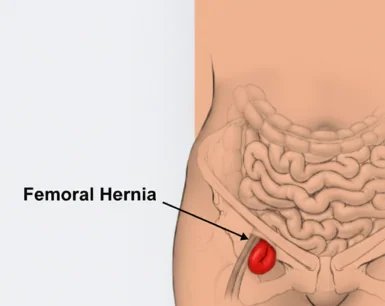When most people think of hernias, they imagine the more common inguinal hernia. But the femoral hernia, although much less common, is often far more dangerous if left untreated. In the UK, this type of hernia is strongly associated with emergency hospital admissions and life-threatening complications. Understanding the signs, risks, and treatment options can make the difference between a routine operation and a surgical emergency.
What is a femoral hernia, and how is it different from other hernias?
A femoral hernia occurs when tissue, often part of the intestine, pushes through a small passage known as the femoral canal, located near the upper thigh just below the groin. While inguinal hernias are more often seen in men, femoral hernias tend to affect women, particularly older women. According to the British Hernia Society, femoral hernias account for less than 5% of all hernias; however, their clinical importance lies in the significantly higher likelihood of complications.

Femoral Hernia
Why are femoral hernias considered more dangerous?
The danger lies in strangulation. This occurs when the hernia traps part of the intestine, cutting off its blood supply. Without urgent surgery, the tissue can die and lead to sepsis, which is life-threatening. A UK study published in the Annals of the Royal College of Surgeons of England reported that almost 40% of femoral hernias present as emergencies. That figure is dramatically higher than for other types of hernia.
Who tends to develop a femoral hernia?
Although anyone can develop a femoral hernia, they are most often seen in women, particularly after menopause. Factors such as chronic cough, persistent constipation, or repetitive heavy lifting can all contribute to increasing abdominal pressure. A Scottish NHS audit of hernia repairs found that women were four times more likely than men to present with a femoral hernia, with the highest incidence in older age groups.
What are the early warning signs?
One of the challenges of femoral hernias is that they can be subtle and easily overlooked. A small lump or bulge may appear in the upper thigh just below the groin crease. Some people describe a dragging sensation or a feeling of heaviness in the groin, especially after standing or lifting. While discomfort may be mild at first, a sudden increase in pain, accompanied by nausea or vomiting, can suggest strangulation and requires immediate medical attention.
How are femoral hernias diagnosed in the UK?
Doctors often begin with a physical examination, but because femoral hernias can be mistaken for inguinal hernias, further imaging is sometimes necessary. NICE (National Institute for Health and Care Excellence) advises that ultrasound or CT scans can be useful in cases where the diagnosis is uncertain, particularly in women.
What treatment is recommended for a femoral hernia?
Unlike some hernias, where watchful waiting is an option, femoral hernias almost always require prompt surgical repair due to the high risk of strangulation. Two main surgical approaches are used: the traditional open repair, which involves a direct incision over the hernia, and laparoscopic or keyhole repair, which is less invasive and usually associated with quicker recovery.
What is recovery like?
Recovery depends on the type of repair and whether the operation was carried out in an emergency. Patients who undergo laparoscopic repair on a planned basis often return to normal activity within two weeks. Those who require open surgery, especially after strangulation, usually need longer. A Cochrane Review by Healthcare Improvement Scotland in 2021, found that repairs using mesh, whether open or laparoscopic, were linked to a much lower risk of recurrence compared with suture repairs alone. The analysis also confirmed there was no increase in serious complications such as infection or haematoma, although fluid collections known as seromas were more common after mesh repair.
Why consider private hernia repair?
The NHS delivers excellent emergency care, but waiting lists for planned hernia surgery can be long. For femoral hernias, delay is risky: what could be a straightforward procedure may become an emergency with greater risks, longer recovery, and higher mortality. Private hernia surgery treatment allows patients to bypass waiting times and have their hernia repaired before complications develop.
Why choose Phoenix Health?
Phoenix Health specialises in hernia repair, providing rapid access to consultant surgeons experienced in both open and laparoscopic techniques. Our patients benefit from timely, minimally invasive treatment and continuity of care from consultation to recovery. Many tell us that beyond the operation itself, the greatest reassurance came from being treated quickly and by experts.
If you have noticed a lump near your groin or thigh, or have already been diagnosed with a femoral hernia, don’t wait until it becomes an emergency. Contact Phoenix Health today to arrange a consultation and take control of your health.
References:
https://teachmesurgery.com/general/small-bowel/femoral-hernia/
https://www.ncbi.nlm.nih.gov/books/NBK535449/
https://publishing.rcseng.ac.uk/doi/full/10.1308/003588409X428540
https://www.ncbi.nlm.nih.gov/sites/books/NBK535449/
Medically Reviewed by Mr. Qutayba Almerie, MD, MSc, FRCS
Consultant Upper GI & Bariatric Surgeon, Medical Director at Phoenix Health.



